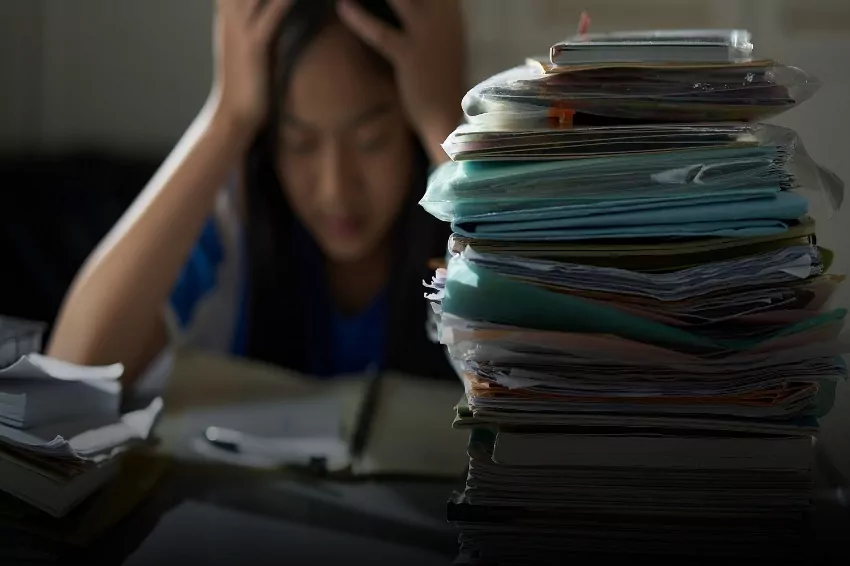

(c) Sixth Tone
In December of 2017, Zhang Meng suffered a mental collapse. The recurrent COVID-19 lockdowns of the student’s university campus in Beijing drove her to the point of complete hopelessness, and she found herself sobbing on the stairs of her dorm room.
Due to the lockdowns, she had to spend most of her time inside her room and was unable to get together with her friends. In addition, there were stringent limitations placed on the times she was permitted to attend the canteen or take a shower. Zhang stated that the limits had “removed the safety net that was holding me up and I felt like my whole existence was crumbling down.” Zhang is the type of person who seeks in-person social engagement.
During that month, she received a diagnosis of serious depression in addition to anxiety.
Yao, who is also 20 years old and has asked that his first name not be used, experienced his first breakdown in high school, where he was a boarder. He was unable to comprehend the rationale behind the stringent lockdown measures at the time. He described how he had to seek sanctuary in the bathroom of the school one day because he was crying so hard that “it seemed like my insides were crying.”
Yao made an attempt at his own life in the beginning of 2021 when he was attending university in Beijing. He was unable to pull himself out of his despair and was also unhappy that he had not taken the classes he wanted to because he was afraid of upsetting his father.
China has taken some of the hardest and most frequent lockdown measures in the world in its drive to eradicate every COVID-19 epidemic. They argue that this helps save lives, and they refer to their low pandemic death toll of roughly 5,200 to date as evidence.
It is an initiative that the government has shown no sign of abandoning, but the policy’s impact on mental health is alarming to medical specialists, and as the experiences of Zhang and Yao have demonstrated, it is already taking its toll. The government has shown little evidence of abandoning this effort.
According to an editorial that was published in June of this year in the British medical magazine the Lancet, “China’s lockdowns have had a massive human cost, with the shadow of mental-illness badly influencing China’s culture and economy for years to come.”
The mental health of teenagers and young adults, who are more susceptible due to their age and the lack of control they have over their lives, as well as the fact that they are forced to contend with significantly greater educational stresses and economic pressures than previous generations, is of particular concern to the experts.
It’s possible that a very large number of young people will be affected. According to an estimate made by China’s Ministry of Education in the year 2020, COVID-19 regulations had resulted in the protracted confinement of approximately 220 million children and young adults in China. A request from Reuters for an up-to-date figure and commentary on the matter was not met with a response from the company.
The COVID-19 limits have on occasion compelled younger people to place themselves in dangerous situations.
For example, during the two-month lockdown that took place in Shanghai this year, some young people between the ages of 15 and 18 were forced to stay in hotels by themselves since they were not permitted to return home.
“They had to cook for themselves and they didn’t have someone to talk to so it was actually very difficult for them,” Frank Feng, the vice principal at Lucton, an international school in Shanghai, told Reuters. “They didn’t have anyone to talk to and they had to fend for themselves.”
Although there is a paucity of statistics assessing the mental health of young people in China and the impact of lockdowns and the pandemic, the data that is available paints a bleak picture.
According to the findings of a survey of 39,751 students in China that was carried out in April 2020 and published in the January issue of the United States journal Current Psychology, approximately twenty percent of junior and senior high school students in China who learn remotely during lockdowns have considered or attempted suicide. Individuals who have suicidal ideation may or may not have the intent to carry out their suicidal thoughts at the time they have these thoughts. Suicidal ideation is frequently described as the belief that a person’s life would be better off without them.
Searches on the Chinese search engine Baidu for the term “psychological counseling” increased by more than three times as much during the first seven months of 2022 compared to the same time period the previous year. This trend was observed across all age groups.
The years leading up to important exams have coincided with COVID-19 lockdowns for many adolescents. Many families are isolating themselves for months before exam periods, according to teachers, because they are desperate to avoid missing a life-changing exam due to the possibility of catching COVID-19 or, much more commonly, being considered a close contact. If the stigma of being infected is not enough to motivate them, the desire to avoid missing the exam is.
The bleak employment prospects just serve to add fuel to the fire of the existing academic strain. As a result of the pandemic and regulatory crackdowns on the technology and tutoring industries, the jobless rate for urban youth has surged to 19.9 percent, which is the highest level on record. This is despite the fact that the overall unemployment rate is currently at 5.4 percent.
Due to China’s one-child policy that was in effect from 1980 to 2015, the vast majority of students are also only children. They are acutely aware of the fact that they will need to assist with the financial maintenance of their parents in the future.
A poll conducted by Fudan University this year among approximately 4,500 young people found that approximately 70% of respondents experienced anxiety to varying degrees.
It is believed that the pandemic and the lockdowns are fueling dissatisfaction with the intense pressure to get ahead in life. This dissatisfaction was symbolized by the so-called “lying flat” movement that gained huge social media traction in China last year as many young people embraced the idea of doing the bare minimum to get by. The pandemic and the lockdowns are also thought to be fueling dissatisfaction with the intense pressure to get ahead in life.
For its part, the Ministry of Education has initiated a number of initiatives to improve the mental health of students during the pandemic. These initiatives include the introduction of mandatory mental health classes at colleges as well as a drive to increase the number of school counselors, therapists, and psychiatrists across the country.
However, the issue of mental health has only recently received more attention in China over the past 20 years, and the attempts of the ministry to place counselors in schools are very recent. The majority of schools probably did not have one the previous year. The organization’s guidelines, which were issued in June 2021, recommend having at least one counselor for every 4,000 children across the country.
The matter has also been brought up in state-run media.
Lu Lin, president of Peking University’s Sixth Hospital, was quoted as saying that the “toll on people’s mental health could last over two decades” in a China Daily article published on June 6 that focused on the mental health impact of COVID-19 curbs on vulnerable groups including teenagers. The article was about the mental health impact of COVID-19 curbs on vulnerable groups including teenagers.
According to him, data from the beginning of the year 2020 reveals that a third of residents who isolated themselves at home had experienced symptoms such as sadness, anxiety, and insomnia.
Lu hypothesized that most people would get better once the outbreak was contained, but that about ten percent wouldn’t be able to fully return to their previous selves. He mentioned that some of his younger patients had developed an addiction to video games, had trouble sleeping, and continued to feel depressed and reluctant to go outside.
Zhang’s perspective on the world has been irreparably damaged as a result of the lockdowns and the despair that followed. After initially being content with her ambitions to study Chinese language and literature, she has been dissatisfied with the way lockdowns have been managed, which has spurred an interest in pursuing her education in another country.
“When I graduated from high school, I had a strong sense of patriotism, but I’ve seen that it’s been eroding over the years. It’s not that I don’t believe the government anymore; rather, it’s more of a feeling that the stench of face masks and hand sanitizer has seeped all the way into the crevices of my bones.”
In a unique melding of old spirituality with new technology, Johor's Tianhou Temple claims to have the first-ever Mazu statue…
Former DIA member Somyi is returning to the hallowed halls of K-Pop following legal troubles and a bitter stint in…
Cebu pride Anton “The Dragon” Raga gave an impressive performance on Sunday night dominating the Sharks Billiards Association (SBA) Philippine…
At ASEAN Headquarters in Jakarta, Dr. Kao Kim Hourn welcomed Professor Nobuhiro Aizawa the dean of Economic Research Institute for…
Mao Saigo etched history on Sunday by winning the Chevron Championship after overcoming a thrilling five-player playoff to become the…
K-Dramas have become a household name around the world in the past two or more decades-from Asia to the Americas,…
This website uses cookies.
Read More